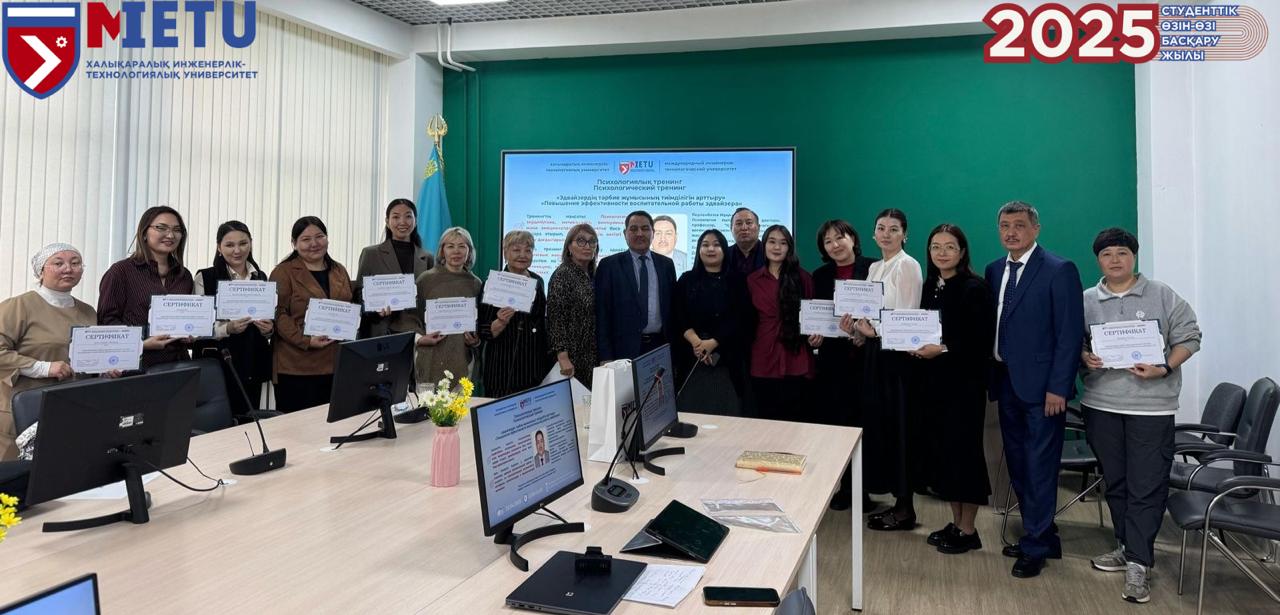Psychological Training for Advisors Held at the International Engineering and Technology University
On April 22, 2025, a psychological training session titled "Enhancing the Effectiveness of Advisors` Educational Work" was held at the International Engineering and Technology University. The event featured participation from Professor Mukhan Athenuly Perlenbetov, President of the Kazakh Psychological Society, Academician of the National Academy of Natural Sciences of Kazakhstan, and Doctor of Psychological Sciences.
The training was organized by the university’s Department of Social and Humanitarian Disciplines and World Languages. Advisors from both the university and its affiliated college actively took part in the session, gaining an opportunity to exchange experiences and develop their professional competencies.
In his opening remarks, Professor Perlenbetov introduced the goals and ongoing work of the Kazakh Psychological Society. He emphasized that the Society’s core mission is to promote psychological knowledge, support professionals, and foster a culture of psychological awareness in society. He also highlighted the important role advisors play in student development beyond academics, stating that their contribution to personal growth and value-based education is a key component of modern higher education.
The training was facilitated by pedagogue-psychologist A.S. Mukhametzhan and multimodal practicing psychologist G.K. Kanapiya. The main objective was to strengthen the psychological skills of advisors, with a focus on motivation, communication, and emotional intelligence, all contributing to more effective student guidance.
The training consisted of three practice-oriented modules. Participants engaged in motivational exercises, scenario-based discussions, real-life case analyses, and group work to share professional insights.
Module I – Motivational Introduction:
The activity "My Personal Triad" helped participants get to know each other and express their perspectives on student development. A discussion followed on "What kind of education does today’s student need?" along with a brief theoretical presentation titled "The Advisor’s Personality as an Educational Tool."
Module II – Effective Methods and Techniques:
Participants analyzed two roleplay scenarios: "Neutral Advisor vs. Active Advisor." In group discussions, they explored the advisor’s functions through the roles of "Mentor," "Supporter," and "Evaluator." Practical case studies were analyzed, addressing issues such as student indifference, disciplinary violations, and psychological distress.
Module III – Reflection and Conclusion:
In the exercise "The Formula of My Educational Work," each participant formulated a personal approach based on their experience. Through the activity "Top 3 Most Valuable Qualities," they highlighted key personal and professional attributes.
The training also addressed common challenges faced by advisors in group settings and explored possible solutions. Participants were offered situational cases and discussed forms of support they could provide. The topic of professional burnout and strategies for its prevention were also examined.
Energizing exercises were included, allowing participants to relax and recharge. At the end, a feedback session was held where participants shared both the strengths and the areas for growth identified during the event.
In his closing remarks, Professor Perlenbetov emphasized:
“Today’s student is the foundation of tomorrow’s society. An advisor is not only an academic guide but also a mentor in values and human connection. Trainings like this promote the professional growth of educators.”
All participants received certificates upon completion of the training.

